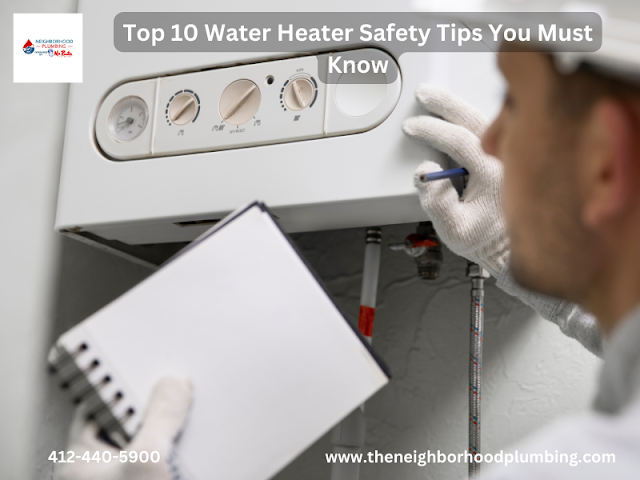Top 10 Water Heater Safety Tips You Must Know
Hot water heaters are essential appliances in our homes, providing us with comfort and convenience. However, it's crucial to prioritize safety when dealing with these devices. In this article, we will explore the top 10 water heater safety tips to help you avoid potential hazards and ensure the proper functioning of your water heater in Pittsburgh.
 |
| Top 10 Water Heater Safety Tips You Must Know |
Regular Maintenance is Key
Routine maintenance is vital to keep your water heater in top condition. Regularly scheduled inspections by a professional technician from a reputable plumbing company in Pittsburgh, like Neighborhood Plumbing, are essential to ensure your water heater's safety. During these inspections, the technician will check for leaks, sediment buildup, and any potential issues that may compromise your water heater's functionality and safety.
Set the Right Temperature
While it may be tempting to crank up the temperature for a steamy shower, setting the water heater temperature too high can lead to scalding accidents. To prevent this, maintain the temperature at or below 120°F (49°C) to ensure a safe and comfortable environment for you and your family. By setting the appropriate temperature, you can avoid accidental burns and safeguard young children and the elderly, who may be more susceptible to hot water injuries.
Keep the Area Clear
To maintain your water heater's safety, avoid cluttering the area around it. The space surrounding your water heater should be kept clear of any items or debris. Clutter can obstruct airflow and cause the unit to overheat, leading to potential malfunctions and safety hazards. It's crucial to clear away any flammable materials or chemicals from the vicinity to reduce the risk of fire hazards.
Install a Pressure Relief Valve
A pressure relief valve is a crucial safety feature that helps release excess pressure from the tank. As the water heats, pressure builds up in the tank, and without a properly functioning relief valve, this pressure could lead to explosions or leaks. Regularly inspect and replace the pressure relief valve to ensure it is in good working condition and can effectively prevent any potential safety risks.
Insulate Exposed Pipes
Exposed hot water pipes can cause burns if accidentally touched. To enhance safety, it's essential to insulate these pipes with heat-resistant materials. This insulation not only prevents injuries but also conserves energy by reducing heat loss during water transportation. Insulating your hot water pipes is a simple yet effective way to ensure the safety and comfort of everyone in your household.
Check for Leaks
Regularly inspect your water heater and its connections for any signs of leaks. Leaking water heaters can cause water damage to your property, leading to costly repairs. Moreover, leaks can indicate internal issues with the water heater that require immediate attention. Detecting and fixing leaks promptly can prevent further damage and ensure your water heater functions safely and efficiently.
Be Cautious with DIY Repairs
While it's tempting to save money and try fixing water heater issues yourself, some problems are best left to professionals. Inadequate repairs can lead to further damage and safety risks. Water heaters are complex appliances that require specialized knowledge and tools for proper repairs. It's essential to contact a licensed plumber, such as Neighborhood Plumbing, to handle any complicated repairs or maintenance tasks, ensuring the safety and functionality of your water heater.
Install Carbon Monoxide Detectors
If your water heater operates on gas, it's essential to install carbon monoxide detectors near the appliance. Carbon monoxide is a deadly gas that can leak from faulty water heaters, posing severe health risks to you and your family. Carbon monoxide detectors will alert you in case of any leaks, allowing you to take immediate action and prevent potential tragedies.
Educate Your Family
Ensuring the safety of your water heater goes beyond routine maintenance and inspections; it also involves educating your family members about potential hazards and safety precautions. Teach everyone in your household how to shut off the gas supply and power to the water heater in case of emergencies. Having this knowledge can be crucial during unexpected situations, helping to minimize risks and protect your family.
Replace Old Water Heaters
Water heaters have a limited lifespan, usually around 8–12 years. If your water heater has reached the end of its life, consider replacing it with a new and more efficient model. Older water heaters are more prone to malfunctions and safety issues. Upgrading to a newer unit will not only improve safety but also save you money on energy bills and provide a reliable supply of hot water.
Conclusion:By following these top 10 water heater safety tips, you can ensure the well-being of your household and prolong the life of your water heater. Regular maintenance, setting the correct temperature, and being cautious around gas appliances are all critical aspects of ensuring a safe and functional water heater. Remember to rely on professionals like Neighborhood Plumbing for inspections and repairs to keep your water heater in the best shape possible. Prioritizing safety will provide you with peace of mind and a reliable supply of hot water for years to come.



Comments
Post a Comment